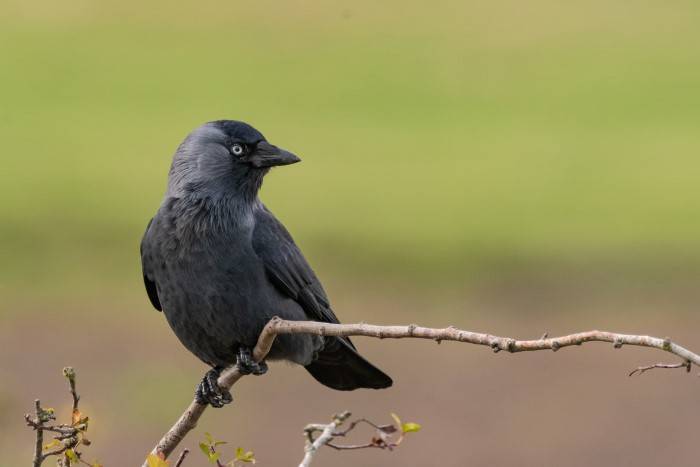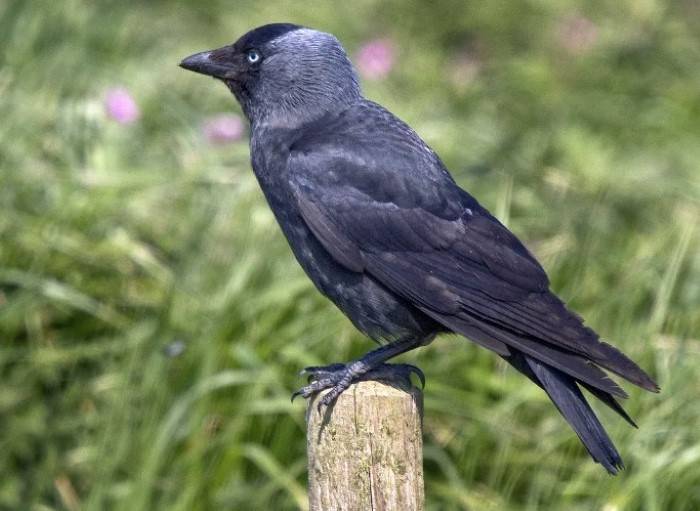With their distinctive gray plumage, sleek black cap, and intelligent eyes, jackdaws are a familiar sight in the skies and landscapes of the United Kingdom. These charismatic corvids, often found in urban areas, woodlands, and agricultural settings, possess remarkable intelligence, social behaviors, and adaptability that have captivated the curiosity of birdwatchers and researchers alike. In this comprehensive guide, we’ll embark on a journey to discover the captivating world of jackdaws in the UK, exploring their habitat preferences, diet and foraging habits, breeding behavior, vocalizations, and the unique role they play in the ecosystem. By gaining insights into the lives of jackdaws, we can deepen our appreciation for these resourceful birds and the vital contributions they make to the natural world.
Exploring Jackdaw Habitat and Distribution
Urban Dwellers:
Jackdaws are highly adaptable birds that thrive in a variety of habitats, including urban environments. In cities and towns across the UK, jackdaws can be spotted nesting in chimneys, rooftops, church spires, and other man-made structures, where they take advantage of the abundance of food and nesting sites.
Woodland Residents:
While jackdaws are commonly associated with urban areas, they also inhabit wooded areas, parks, and forest edges, where they nest in tree cavities, old buildings, and rock crevices. Woodland habitats provide jackdaws with ample opportunities for foraging, roosting, and nesting in natural settings.
Agricultural Landscapes:
Jackdaws are frequently found in agricultural landscapes, where they forage for insects, seeds, grains, and agricultural waste in fields, pastures, and farmyards. Their adaptability to diverse habitats and food sources enables them to thrive in rural areas as well as urban and suburban settings.
Dietary Preferences and Foraging Behavior
Omnivorous Diet:
Jackdaws are opportunistic feeders with a diverse diet that includes insects, earthworms, small vertebrates, seeds, grains, fruits, and human food scraps. Their omnivorous nature allows them to exploit a wide range of food sources found in both natural and human-altered environments.
Foraging Strategies:
Jackdaws employ various foraging strategies to obtain food, including ground foraging, probing in soil and leaf litter for invertebrates, scavenging in urban areas for discarded food, and raiding agricultural fields for grains and seeds. They are also known to follow plows and tractors to feed on exposed earthworms and insects.
Caching Behavior:
Like other corvid species, jackdaws exhibit caching behavior, where they store surplus food items in multiple locations for future consumption. Caching helps jackdaws to secure food resources during times of scarcity and may also play a role in mate attraction and territory defense.
Breeding Behavior and Nesting Habits
Monogamous Pairs:
Jackdaws are monogamous birds that typically form long-term pair bonds with a single mate. During the breeding season, pairs engage in courtship displays, mutual preening, and vocalizations to strengthen their bond and establish their nesting territory.
Nest Sites:
Jackdaws construct their nests in a variety of locations, including tree cavities, old buildings, cliffs, and rocky outcrops. They often use twigs, grass, moss, and other plant materials to build a cup-shaped nest lined with softer materials such as feathers, wool, and fur.
Colonial Nesters:
While jackdaws may nest individually or in small family groups, they are also known to nest in colonies, particularly in urban areas where suitable nesting sites are abundant. Colonial nesting provides jackdaws with added protection against predators and facilitates social interactions among individuals.
Vocalizations and Communication
Calls and Vocalizations:
Jackdaws are vocal birds that produce a variety of calls and vocalizations to communicate with one another. Their vocal repertoire includes harsh, metallic “jack” calls, nasal “chak” calls, and softer cooing or purring sounds. Vocalizations play a crucial role in maintaining social bonds, coordinating group activities, and signaling potential threats.
Alarm Calls:
Jackdaws are vigilant birds that use alarm calls to warn members of their group about potential dangers, such as approaching predators or human disturbances. Alarm calls vary in intensity and duration depending on the perceived level of threat, helping to mobilize the group’s defensive response.
Cultural Significance and Folklore
Historical Associations:
Throughout history, jackdaws have been associated with various cultural beliefs, superstitions, and folklore. In British folklore, jackdaws are sometimes regarded as symbols of intelligence, resourcefulness, and adaptability, while in other cultures, they may be viewed as omens of good or bad luck.
Literary References:
Jackdaws have appeared in literature, poetry, and mythology as symbolic figures representing themes such as cunning, mischief, and resilience. From Aesop’s fables to Shakespearean plays, jackdaws have left their mark on literary imagination and storytelling traditions.
Jackdaw UK
Conservation Considerations and Future Research
Urban Ecology:
As urbanization continues to expand, understanding the ecological role of jackdaws in urban ecosystems is essential for effective conservation planning and management. Research on jackdaw population dynamics, habitat preferences, and interactions with other urban wildlife species can inform strategies to promote coexistence and biodiversity conservation.
Climate Change Impacts:
Climate change may pose challenges for jackdaw populations, affecting their habitat availability, food resources, and breeding success. Monitoring population trends, assessing habitat suitability, and implementing habitat restoration initiatives are critical for mitigating the impacts of climate change on jackdaw populations.
Related Post:
How to Keep Birds Away from Patio
Jackdaws are fascinating birds that enrich the landscapes and skies of the United Kingdom with their intelligence, adaptability, and social behaviors. From their urban roosts to their woodland habitats, jackdaws play important ecological roles as scavengers, seed dispersers, and contributors to ecosystem health. By studying the behavior, ecology, and cultural significance of jackdaws, we gain a deeper appreciation for these remarkable birds and the interconnectedness of nature in our midst. As stewards of the environment, let us celebrate the charms of jackdaws and work together to conserve their habitats and ensure their continued presence in the UK for generations to come.




